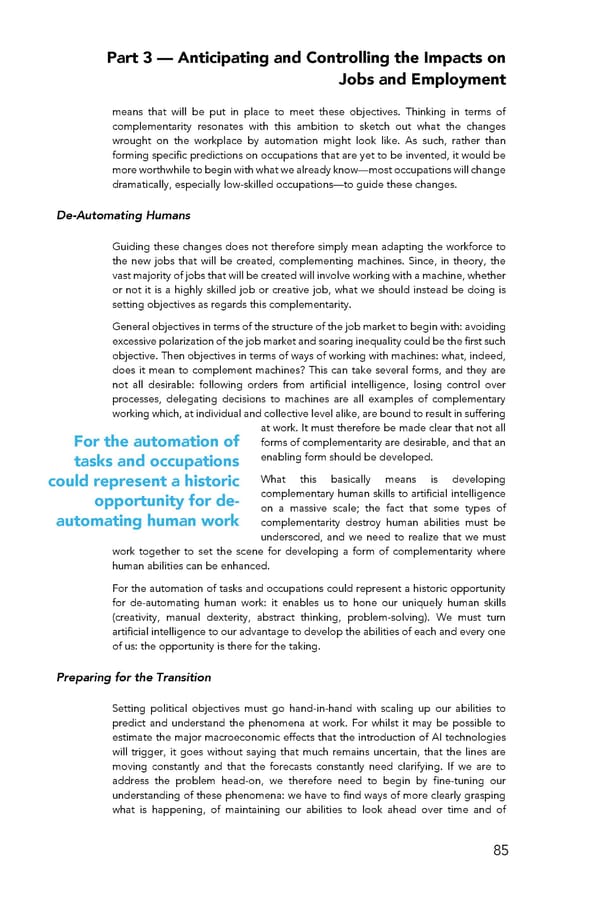Part 3 — Anticipating and Controlling the Impacts on Jobs and Employment means that will be put in place to meet these objectives. Thinking in terms of complementarity resonates with this ambition to sketch out what the changes wrought on the workplace by automation might look like. As such, rather than forming specific predictions on occupations that are yet to be invented, it would be more worthwhile to begin with what we already know—most occupations will change dramatically, especially low-skilled occupations—to guide these changes. De-Automating Humans Guiding these changes does not therefore simply mean adapting the workforce to the new jobs that will be created, complementing machines. Since, in theory, the vast majority of jobs that will be created will involve working with a machine, whether or not it is a highly skilled job or creative job, what we should instead be doing is setting objectives as regards this complementarity. General objectives in terms of the structure of the job market to begin with: avoiding excessive polarization of the job market and soaring inequality could be the first such objective. Then objectives in terms of ways of working with machines: what, indeed, does it mean to complement machines? This can take several forms, and they are not all desirable: following orders from artificial intelligence, losing control over processes, delegating decisions to machines are all examples of complementary working which, at individual and collective level alike, are bound to result in suffering at work. It must therefore be made clear that not all For the automation of forms of complementarity are desirable, and that an tasks and occupations enabling form should be developed. could represent a historic What this basically means is developing opportunity for de- complementary human skills to artificial intelligence on a massive scale; the fact that some types of automating human work complementarity destroy human abilities must be underscored, and we need to realize that we must work together to set the scene for developing a form of complementarity where human abilities can be enhanced. For the automation of tasks and occupations could represent a historic opportunity for de-automating human work: it enables us to hone our uniquely human skills (creativity, manual dexterity, abstract thinking, problem-solving). We must turn artificial intelligence to our advantage to develop the abilities of each and every one of us: the opportunity is there for the taking. Preparing for the Transition Setting political objectives must go hand-in-hand with scaling up our abilities to predict and understand the phenomena at work. For whilst it may be possible to estimate the major macroeconomic effects that the introduction of AI technologies will trigger, it goes without saying that much remains uncertain, that the lines are moving constantly and that the forecasts constantly need clarifying. If we are to address the problem head-on, we therefore need to begin by fine-tuning our understanding of these phenomena: we have to find ways of more clearly grasping what is happening, of maintaining our abilities to look ahead over time and of 85
 For a Meaningful AI - Report Page 85 Page 87
For a Meaningful AI - Report Page 85 Page 87